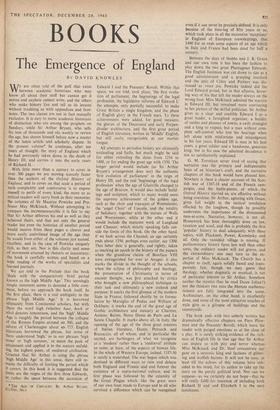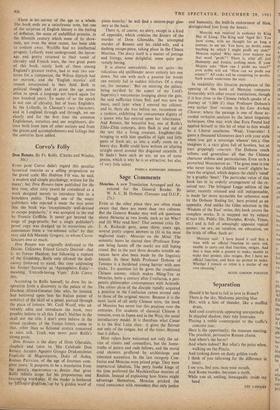BOOKS
The Emergence of England
By DAVID KNOWLES
WE are often told of the gulf that exists between academic historians who may know all about their stuff but cannot get it across and anyhow cannot write, and the others who make history live and tell us its lessons without troubling us with appendices and foot- notes. The two classes are not in fact mutually exclusive. It is easy to name academic historians of distinction who are among the prophets on Sundays, while Sir Arthur Bryant, who sells his tens of thousands and sits weekly to review the age, has shown himself before now a master of the latest article and scholarly dispute. In the present volume* he continues, after ten years of thought, the story of England which he had previously taken down to the death of Henry III, and carries it into the early years of Richard II.
With little more than a century to cover in over 500 pages we are moving scarcely faster than the authors of the Oxford History of England, and to cover on that scale a period of such complexity and controversy is to expose oneself to perils of every kind, the more so as critical readers will carry fresh in their memories the volumes of Sir Maurice Powicke and Pro- fessor May McKisack. Without attempting to compare the incommensurable it is fair to say that sir Arthur achieves his end as well as they achieved theirs, and that not only the general reader but even the historian of another period would receive from these pages a clearer and more easily assimilated image of the age than he would from either of the volumes just named, excellent, and in the case of Powicke uniquely rich, as they are. Nor is this clarity and sense of movement attained by rhetoric or inaccuracy; the book is carefully written and based on a wide reading of the works of specialists and learned journals.
We are told in the Prelude that the book 'deals with the comparatively brief period known as the high Middle Age.' This seemingly simple statement seems to demand a little com- ment, before we approach the book itself. In the first place, there is a ,real ambiguity in the phrase 'high Middle Age.' It is borrowed ultimately from Continental scholars, but with them the word high (whether harm, Koch or alto) denotes remoteness, and the 'high' Middle Age. is roughly the period between the collapse of the Roman Empire around AD 500, and the advent of Charlemagne about AD 775. English historians borrowed the phrase, but some of them understood 'high,' as in our phrases 'high noon' or 'high summer,' to mean the peak of attainment and applied it to the mature unfold- ing, the highest point, of medimval civilisation. Granted that Sir Arthur is using the phrase 'high Middle Age' in this sense, there still re- mains the difficulty of limiting the period which. it covers. In this book it is suggested that the limits are the reigns of the first three Edwards, or rather the space between the accession of * THE AGE of CHIVALRY. By Arthur Bryant. (Collins, 36s.)
Edward 1 and the Peasants' Revolt. Within that space, we are told, took place, 'the first evolu- tion of parliament, the beginnings of the legal profession, the legislative reforms of Edward I,' the attempts, only partially successful, to make Great Britain a single kingdom, and the phase of English glory in the French wars. To these achievements were added, for good measure, the glories of the Decorated and early Perpen- dicular architecture, and the first great period of English literature, written in 'Middle' English, but still easily recognisable as our mother tongue.
All attempts to periodise history are ultimately misleading and futile, but much might be said for either extending the dates from 1216 to 1400, or for ending the great age with 1350. The longer period would include (as Sir Arthur Bryant's arrangement does not) the authentic 'first evolution of parliament' in the reign of Henry III, and the real 'beginnings of the legal profession' when the age of Glanville changed to the age of Bracton. It would also include build- ings and sculpture, which to many would seem the supreme achievement of the golden age, such as the choir and transepts of Westminster, the 'angel Choir' of Lincoln, and the totality of Salisbury, together with the statues of Wells and Westminster, while at the other end it would include the maturest work of Langland and Chaucer, which strictly speaking falls out- side the limits of this book. On the other hand, if we look across the Channel, an age certainly ends about 1350, perhaps even earlier, say 1300. That latter date is generally, and rightly, taken as marking an epoch in the history of the papacy when the grandiose claims of Boniface VIII were extinguished for ever at Anagni; it also marks the divide in the thought of the schools, when the eclipse of philosophy and theology, the presentation of Christianity in terms of ancient thought, was first attacked by critics who brought a new philosophical technique to their task and ultimately a new outlook and purpose. It marks the first glimpse of the modern State in France, followed shortly by its formu- lation by Marsiglio of Padua and William of Ockham; it marks the end of the great age of Gothic architecture and statuary at Chartres, Amiens, Reims, Notre Dame de Paris and La Sainte Chapelle. It marks above all, in Italy, the opening of the age of the three great creators of. Italian literature, Dante, Petrarch and Boccaccio, all of whom, and in particular the second, are harbingers of what we recognise as a 'modern' rather than a 'mediaeval' attitude to some, at least, of the aspects of human life. In the whole of Western Europe, indeed, 1337-50 is surely a watershed. The war began which was destined in different ways to ruin and debase both England and France and end forever the existence of a supra-national culture, and its first phase was followed by the calamity of the Great Plague which, like the great wars of our own time, made to Europe and to all who survived a difference which can be recognised even if it can never be precisely defined. It is only bectiuse of the time-lag of fifty' years or so, which took place in all the successive 'receptions' in England of European reawakenings, that 1400 for us ends some aspects of an age which in Italy and France had been dead for half a century.
Between the days of Stubbs and J. R. Green and our own time it has been the fashion to play down the two great Plantagenet Edwards. The English Justinian was cut down to size as a good administrator and a grasping overlord and the epic of Crecy and Poitiers was dis- missed as vieux jell. Powicke indeed did the Lord Edward proud, but in that allusive, hover- ing way of his that left the reader always on the wrong foot. Miss McKisack admired the warrior in Edward 11I, but remained more convincing in her picture of the skilful politician. Sir Arthur gives us a clear and credible Edward I as a great leader, a farsighted organiser, a builder of castles and planner of towns, a swift strategist and a king to respect, but a man without com- plete self-control who lost his bearings when left alone with misfortune and misjudgment in his last years. Edward HI is seen in his best years, a great soldier and a handsome, generous king; but in his case the admitted decadence is not so satisfactorily explained.
G. M. Trevelyan never tired of saying that narrative was the primary and indispensable basis of an historian's craft, and the narrative chapters of this book would have pleased him. Nowhere is there a clearer account- of the Scot- tish war of 1307-18 and of the French cam- paigns, and the battle-pieces, of which . the Oxford History starved us, are effective without being overdone. Sir Arthur, agreeing with Oman, gives full weight to the tactical revolution effected by the longbow, though he possibly underrates the importance of the dismounted men-at-arms. Narrative, however, is not all. Homework has been thoroughly done on law, taxation 'and wool, and this is probably the first 'popular' history to deal adequately with these topics, with Plucknett, Power, Kosminsky and all. Only the vanished village is missing. If parliamentary history fares less well than other sorts, the ordinary reader will not grieve, and the extraordinary one may turn to the ex- pertise of Miss McKisack. The Church has a chapter to itself, again solidly based and trans- parently fair, though we may guess that theology, whether dogmatic or mystical, is not of particular interest to Sir Arthur. Somehow neither the mystics (has he read Dame Julian?) nor the thinkers (we miss the Merton mathema- ticians) are fully integrated into the scene. Architecture, on the other hand, is excellently done, and some of the most attractive touches of style give us a glimpse of buildings and the countryside.
The book ends with two soberly written but dramatically effective chapters on Piers Plow- man and the Peasants' Revolt, which leave the reader with purged emotions as at the close of a play. It is surely striking evidence of the rich- ness of English life in that age that Sir Arthur can inspire us with pity and terror whereas Miss McKisack and Dr. Steel concentrate our gaze on a neurotic king and factions of glitter- ing and wolfish barons. It will not be easy, at least till 'the echoes of this volume have sub- sided in his mind, for its author to take up the story on the purely politidal level. Nor can we suppose—as we certainly do not hope—that he will really fulfil/his intention of including both Richard 11 and and Elizabeth I in the next instalment. There is no survey of the age as a whole. The book ends on a cataclysmic note, but one of the surprises of English history is the feeling of deflation, the sense of unfulfilled promise, in the fifteenth century which none of its show- men, not even the most recent, has been able to conjure away. Wycliffe had no intellectual progeny, Lollardy went underground, the baron- age and gentry returned to their vomit of chivalry and French wars, the two great poets of this book, surely both of them among England's greatest twelve, had to wait two cen- turies for a companion, the Wilton diptych had no morrow, and the 'English mystics' still remain unsurpassed in their field. Both in political thought and in prose the age seems often to speak a language not heard again for two hundred years. To many of us the epoch is not one of chivalry, but of basic Englishry. In the Lollards, in Chaucer's racy characters, and in Langland through and through, we see clearly and for the first time the common Englishman, ourselves and our neighbours, dis- tinct both from men of other nations and from the graces and accomplishments and failings that the centuries have added.































 Previous page
Previous page